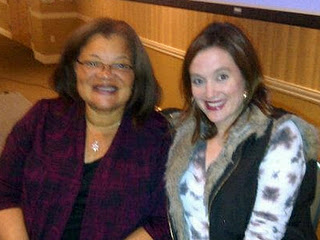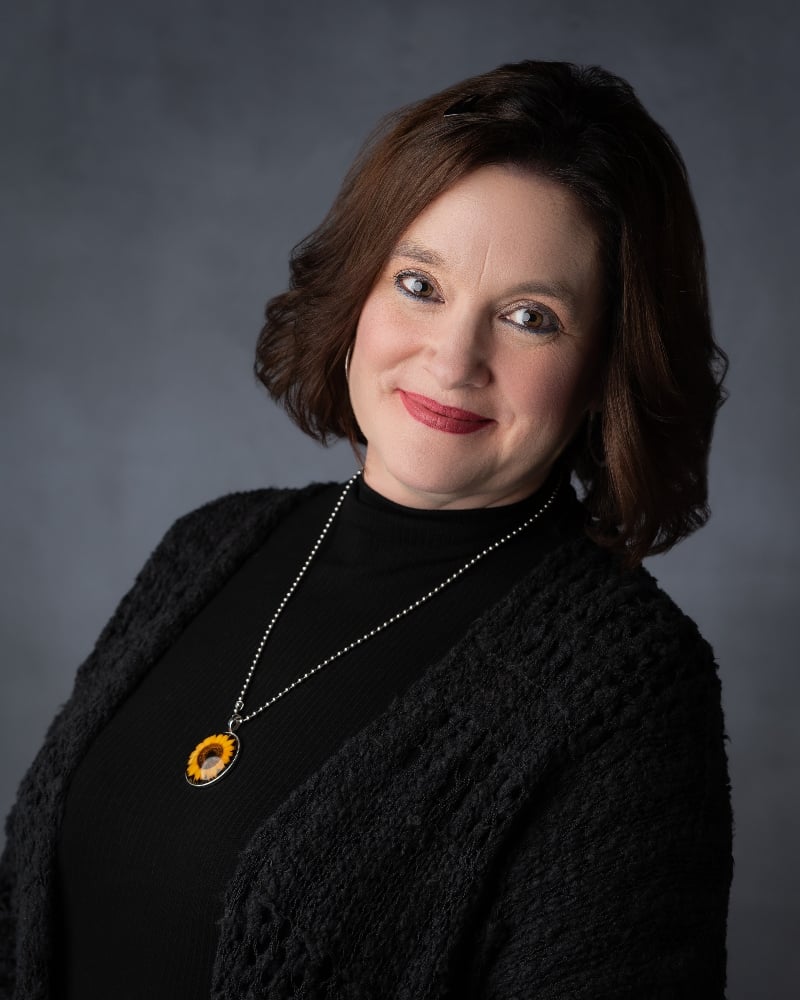
It’s not the best photo quality, true, but it’s evidence that I had the honor of brushing shoulders with the niece of the great Dr. Martin Luther King Jr.
And what do I most want to say about her, now that I’ve met her? Well, she’s a beautiful soul, a light. She’s someone who has her priorities straight, and she moves through the world with one main thing on her mind: love.
Dr. Alveda King’s time in Fargo the other night was sponsored in part by the Collegians for Life. She spoke on behalf of Priests for Life and came to set the record straight, including about some of the things that have gone wrong in her life, and all of the blessings that have poured forth from it as well.
One of the most profound things she shared with us, and with me when I interviewed her the week prior on our local Catholic radio station, was that she was a near-miss. Alveda King almost wasn’t. She was the product of young love that produced a child; a child slated for abortion. That is, until her granddaddy, whom she affectionately referred to as Daddy King, took his daughter aside and said, “That’s my granddaughter you’re talking about. I saw her in a dream three years ago. She’s going to have light skin and reddish hair. You can’t kill her.”
Indeed, Alveda — a combination of the family name Alfred and veda, or “life” — did have fairer skin than some in her family, and reddish hair, attributed no doubt to the King line of the family hailing from Ireland.
Ireland? That’s right. Dr. King is a true, real-life melting pot — a symbol of many elements of the human race in one package. She’s Irish, African and Native American, she said. How beautiful is that? Preaching also is a common theme in her bloodline, as most know. One of her great-grandfathers was a preacher-slave. The bloodlines all point to a common theme: the valiant fight for liberation.
But there was more that Dr. King wanted to share, and in this there seemed a particular urgency. Some of her words aren’t welcomed words to some, specifically those relating to her beloved uncle.
Such as the fact that Margaret Sanger, founder of Planned Parenthood, once said, “We don’t want the word to go out that we want to exterminate the Negro population.” Despite her words, Sanger offered Dr. Martin Luther King Jr. the Margaret Sanger Award in 1966. He stayed home that night, and his wife accepted the award for him.
What did he have to say on the subject of life back in those mid-1960s days when the world was ablaze in civil rights issues? According to his niece, “He said, ‘The Negro cannot win if he’s willing to sacrifice the futures of his children for immediate personal comfort and safety.’”
Alveda calls herself post-abortive and healed. She’s a non-denominational Christian, a mother of six, a grandmother, a music writer and producer, and an astute speaker on civil rights of the tiniest variety — that of the child in the womb.
“In 1983, I was born again, and I began to emerge with a message,” she said. “Some say a woman has a right to do what she wants with her body, but a baby is not her body.” It’s a separate entity, she noted, as physicians who try to save the life of both mother and child know well.
So what else did she reveal about her uncle? For one, he loved sweet-potato pie. And one time, when she was a teenager growing into womanhood, her uncle remarked that even though they weren’t violent people, he and his brother (her father) might just have to get a baseball bat to keep the boys away from Alveda. She would never forget that comment and how special it made her feel.
I wasn’t surprised when, upon doing an online search, I found controversy surrounding Dr. King’s testimonials. Some would contend her uncle was not who she says he was. But I’ve moved now from just reading words on a paper. I sat in the front row at her talk, just a few feet from the podium, and heard from her in person. I witnessed the calm way she moved, the way she spoke with gentle conviction. From everything I’ve observed, this is a woman who sees clearly and embraces our wounded world in love, just like her uncle.
Copyright 2011 Roxane Salonen
About the Author

Roxane Salonen
Roxane B. Salonen, Fargo, North Dakota (“You betcha!”), is a wife and mother of a literal, mostly-grown handful, an award-winning children’s author and freelance writer, and a radio host, speaker, and podcaster (“ Matters of Soul Importance”). Roxane co-authored “ What Would Monica Do?” to bring hope to those bearing an all-too-common cross. Her diocesan column, “ Sidewalk Stories,” shares insights from her prolife sidewalk ministry. Visit RoxaneSalonen.com


.png?width=1806&height=731&name=CatholicMom_hcfm_logo1_pos_871c_2728c%20(002).png)
Comments